
Why Special Shaped Copper Tubes Are a Game-Changer in the Medical Device Industry
In the ever-evolving medical device industry, the demand for precision, durability, and innovation is at an all-time high. One material that has steadily risen in importance is copper, particularly in the form of special shaped copper tubes. These tubes, customized to fit specific applications, are playing a crucial role in enhancing the performance, safety, and functionality of medical devices. From diagnostic tools to implantable devices and surgical instruments, special shaped copper tubes are transforming the way healthcare professionals design and use medical technologies.
Precision Engineering for Complex Medical Devices
The medical device industry relies heavily on precision engineering to ensure that equipment functions effectively and meets stringent regulatory standards. Special shaped copper tubes offer high precision and customizability that make them ideal for use in a variety of medical applications, particularly where exact dimensions and fit are critical.
Custom Shapes for Unique Medical Devices
Unlike standard copper tubes, special shaped copper tubes can be custom-manufactured by copper tube manufacturers to fit specific needs, from curved shapes for ergonomic designs to coiled tubes for compact systems. This flexibility allows manufacturers to produce medical devices that are both efficient and compact.
Example: Endoscopy tools often require tubes with intricate curves or specialized fittings. Special shaped copper tubes, made by copper tube suppliers, can be tailored to meet these specifications, ensuring seamless operation within the human body.
Improved Functional Performance
In certain medical devices, tubes must be able to handle different forces such as pressure, tension, and thermal expansion. Special shaped copper tubes are designed to withstand these conditions, ensuring that devices function properly in diverse environments.
Example: In heating and cooling systems used for certain diagnostic equipment, copper's excellent thermal conductivity ensures that heat is effectively managed, keeping devices from overheating and maintaining consistent performance. Copper tube factories can manufacture tubes that meet these specific requirements, optimizing the performance of medical devices.
|
Feature |
Special Shaped Copper Tubes |
Standard Copper Tubes |
|
Customizability |
High: Can be shaped to specific requirements |
Low: Standardized shapes and sizes |
|
Precision |
Very high: Precision-engineered for medical devices |
Standard precision |
|
Thermal Conductivity |
Excellent: Ensures optimal heat management |
Standard conductivity, less efficient |
|
Corrosion Resistance |
Very high: Ideal for body contact or harsh environments |
Variable: May need coatings for resistance |
|
Ergonomics and Flexibility |
High: Can be shaped to fit ergonomic designs |
Limited: Typically rigid and less flexible |
Superior Heat Transfer and Conductivity
Copper is renowned for its superior thermal conductivity, making it an ideal material for applications that require heat exchange. Special shaped copper tubes leverage this property in various medical devices, particularly in cooling systems or heat exchangers.
Cooling Systems in Medical Equipment
Many medical devices, such as MRI machines, CT scanners, and surgical lasers, generate significant amounts of heat during operation. Copper tubes, especially those with specialized shapes, are used to dissipate heat efficiently, ensuring that the devices remain cool and operational for long periods.
Example: In MRI machines, special shaped copper tubes are often used in the cooling systems to prevent overheating, which could compromise the machine’s performance and lead to equipment failure. Copper tube manufacturers produce tubes designed for this high-demand application, ensuring reliable performance.
Efficient Thermal Management in Medical Implants
Copper is also increasingly being used in implantable medical devices, such as pacemakers or neurostimulators, where thermal regulation is essential. Special shaped copper tubes in these devices help to manage heat dissipation, preventing overheating of sensitive internal components.
Example: Cardiac pacemakers use copper-based materials in their thermal management systems to ensure that the temperature of the device stays within safe limits, protecting patients from potential complications. Copper tube suppliers provide customized tubes for these critical applications, contributing to patient safety.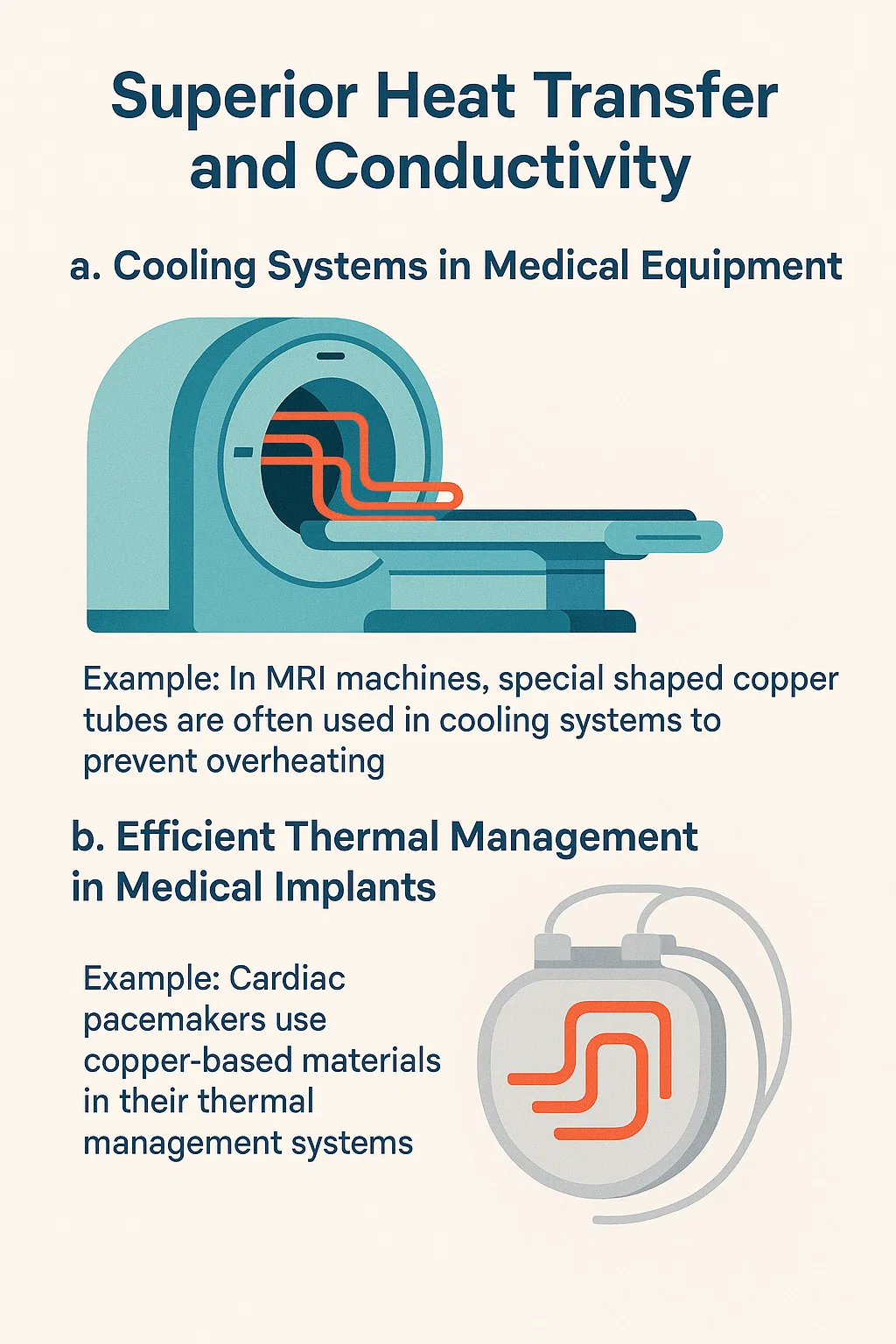
Biocompatibility and Corrosion Resistance
In the medical field, materials need to meet stringent biocompatibility standards to ensure they do not cause adverse reactions when in contact with human tissue. Copper is naturally biocompatible and, when alloyed or treated correctly, can offer excellent resistance to corrosion. This makes special shaped copper tubes an attractive choice for medical devices that come into contact with body fluids or are implanted inside the human body.
|
Medical Device Type |
Copper Tube Use |
Key Benefit |
|
Implantable Devices |
Vascular stents, pacemakers |
Copper’s corrosion resistance ensures long-term durability inside the body. |
|
Surgical Tools |
Forceps, clamps |
Copper’s antimicrobial properties help reduce the risk of infection during procedures. |
|
Diagnostic Equipment |
Endoscopes, biopsy tools |
Copper tubes provide strength, flexibility, and hygiene during use. |
Long-Term Durability in Implantable Devices
One of the significant advantages of copper is its resistance to corrosion over time, especially in saline or moist environments. In devices that are implanted within the body, such as stents or catheters, the ability of copper tubes to withstand corrosion and maintain their structural integrity is paramount to the safety and efficacy of the device.
Example: Vascular stents often use copper alloys, as the material’s non-reactive nature prevents the formation of harmful reactions with body tissues, ensuring the device remains effective throughout its lifespan. Copper tube factories produce high-quality copper tubes that are ideal for such medical applications, maintaining their strength and integrity even in challenging environments.
Minimized Risk of Infection
Copper’s natural antimicrobial properties help reduce the risk of infection in medical devices that are used in or around the human body. Special shaped copper tubes are increasingly used in catheters and other medical instruments where hygiene is critical.
Example: Antimicrobial copper tubes are incorporated into surgical tools to prevent bacterial growth, improving patient outcomes and reducing the likelihood of post-surgical infections. The expertise of copper tube suppliers is critical in ensuring that these antimicrobial properties are maintained in the finished product.
Enhanced Flexibility and Ergonomics
Special shaped copper tubes are not just about technical performance—they also offer ergonomic benefits, particularly in medical devices that need to be used in confined spaces or need to conform to human anatomy.
Flexible Tubing for Minimally Invasive Procedures
Copper tubes, when specially shaped and bent, can be used in minimally invasive medical devices. For example, in laparoscopic surgeries or endoscopy, the ability to manipulate the shape and size of copper tubes allows surgeons to work more efficiently, even in hard-to-reach areas of the body.
Example: Endoscopic instruments often require tubes that can be bent or curved without compromising their strength or structural integrity. Special shaped copper tubes, made by copper tube manufacturers, fit this requirement perfectly, allowing for greater flexibility during procedures.
Customization for Patient Comfort
In medical devices such as hearing aids, prosthetics, or dental implants, special shaped copper tubes can be customized to fit the exact anatomical contours of individual patients. This customization improves both the comfort and effectiveness of the device.
Example: Hearing aids use specialized copper tubes for the sound delivery system, and their custom shape helps to fit them snugly in the ear canal, improving both comfort and sound quality. Copper tube suppliers can provide these tailored solutions to ensure optimal performance in personal medical devices.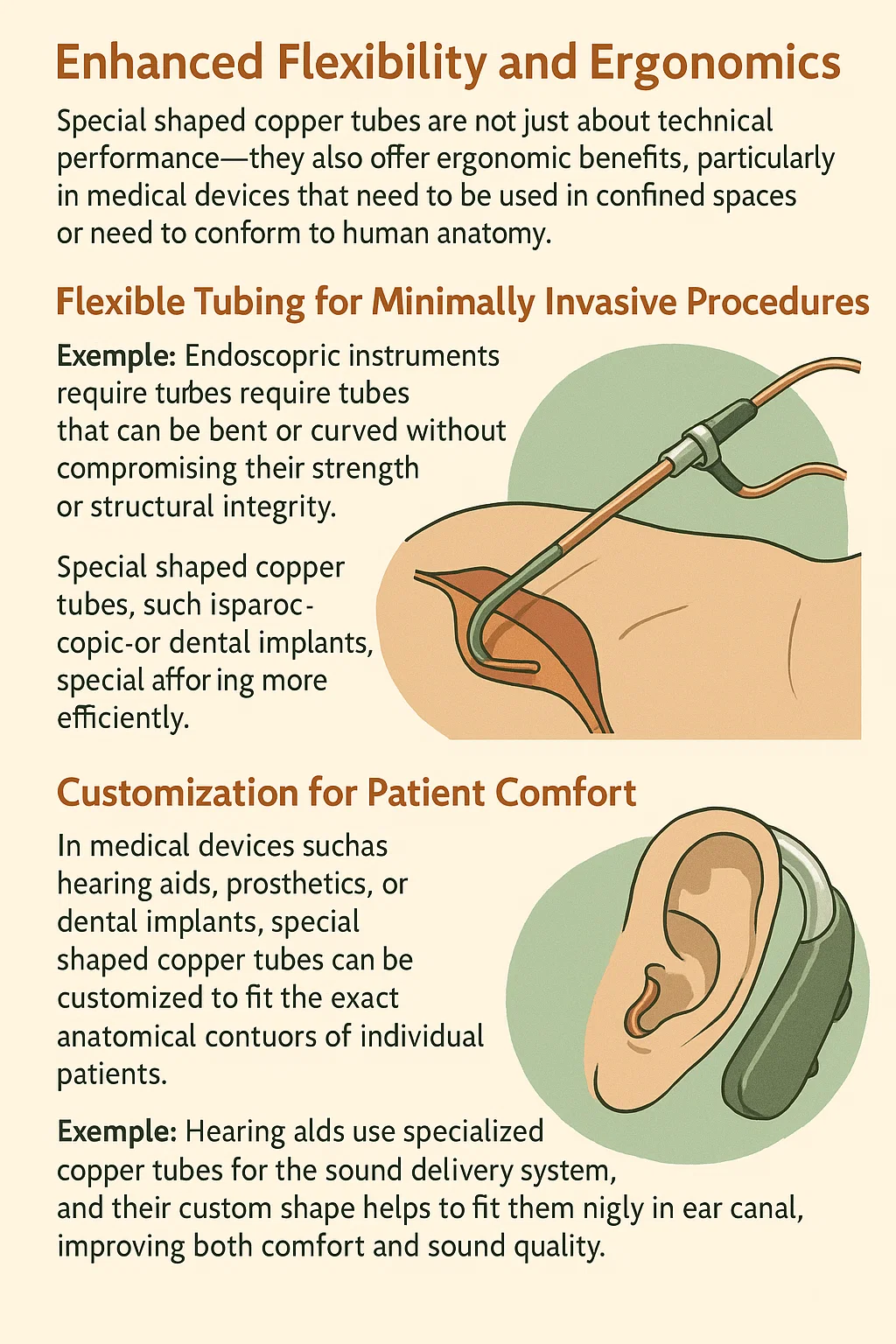
Applications in Diagnostic and Monitoring Devices
Special shaped copper tubes are crucial in a variety of diagnostic and monitoring devices. Their flexibility, combined with their conductive and corrosion-resistant properties, makes them ideal for use in medical equipment that requires real-time monitoring and data collection.
|
Device Type |
Copper tube applications |
Advantages |
|
Temperature sensor |
For use in neonatal incubators or intensive care units |
Efficient heat conduction to maintain stable temperature |
|
Portable oxygen concentrator |
Maintain continuous flow to ensure normal oxygen supply |
Flexible and reliable oxygen delivery system |
Sensors and Diagnostic Tools
Special shaped copper tubes are often used in sensors and monitoring devices that track physiological parameters, such as blood pressure, temperature, and oxygen levels. Their ability to conduct electricity without degrading over time makes them ideal for the precise needs of diagnostic systems.
Example: Temperature sensors used in incubators for newborns or in critical care units rely on copper tubes for optimal heat conduction, ensuring that the system remains stable and accurate. Copper tube factories play a key role in producing tubes that meet the precise needs of these sensitive devices.
Flexible Monitoring Systems for Home Use
In the growing field of home healthcare, special shaped copper tubes are also being used in devices such as portable oxygen concentrators and personal glucose monitors, where both flexibility and reliability are essential.
Example: Home oxygen therapy devices often use special shaped copper tubes to maintain consistent airflow and ensure that patients receive the proper levels of oxygen at all times. Copper tube suppliers provide these flexible and reliable solutions for both hospital and home settings.
Future Potential of Special Shaped Copper Tubes in Medical Innovation
As the medical device industry continues to innovate, special shaped copper tubes will undoubtedly play an increasingly vital role in pushing the boundaries of medical technology. With growing demand for smart medical devices, wearables, and personalized medicine, copper tubes offer customizability and versatility that are critical for the future of healthcare.
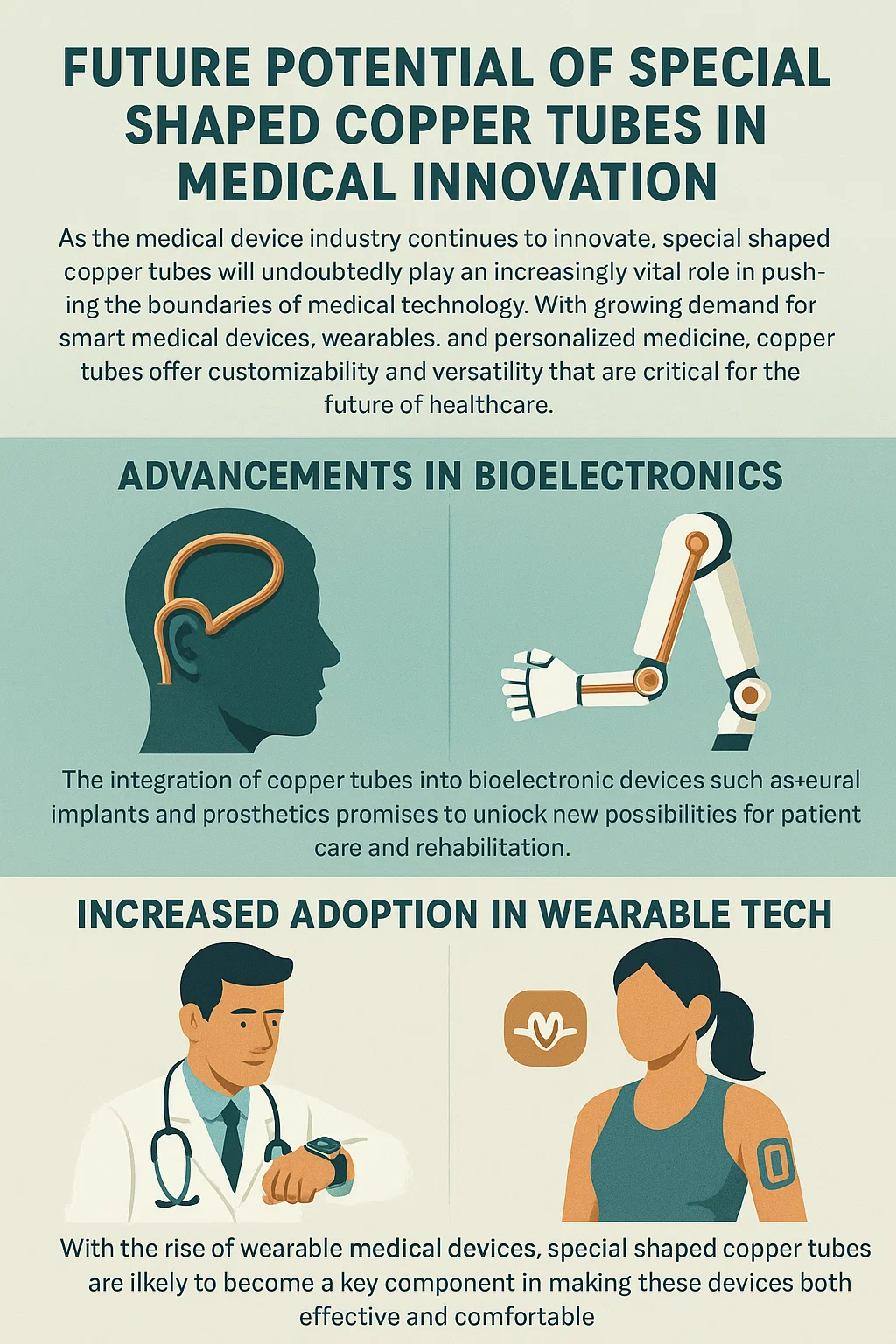
Advancements in Bioelectronics: The integration of copper tubes into bioelectronic devices such as neural implants and prosthetics promises to unlock new possibilities for patient care and rehabilitation.
Increased Adoption in Wearable Tech: With the rise of wearable medical devices, special shaped copper tubes are likely to become a key component in making these devices both effective and comfortable.
Product Category
Related news
-
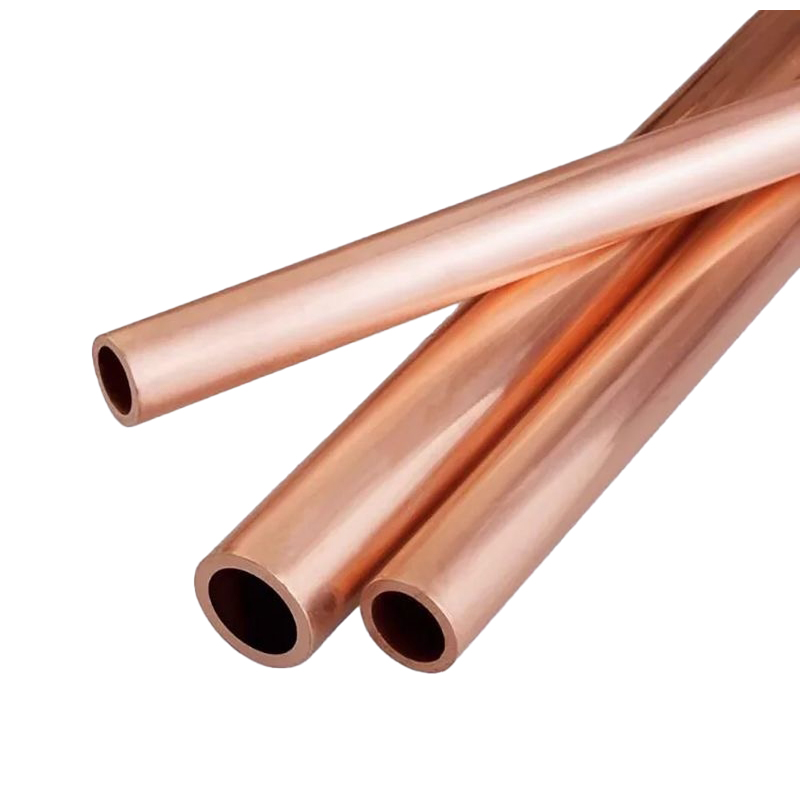
What is a thick-walled copper tube? Thick-walled copper tube, also known as seamless thick-walled copper tube, is a high-performance metal tube made o...
See Details -
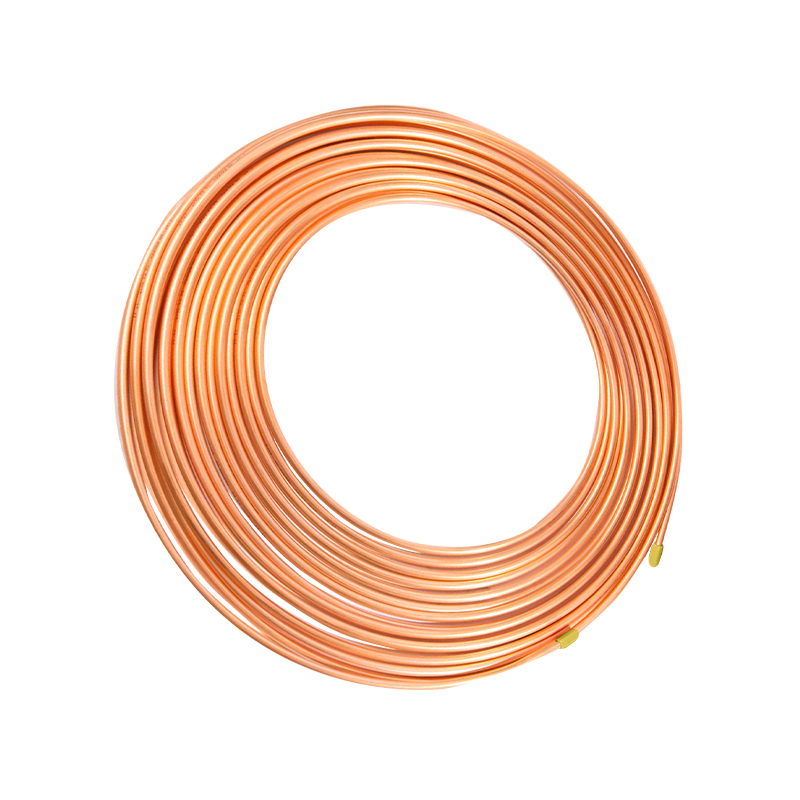
Overview and Importance of Copper Capillary Tube In modern industrial equipment and precision control systems, miniaturization and high precision have...
See Details -
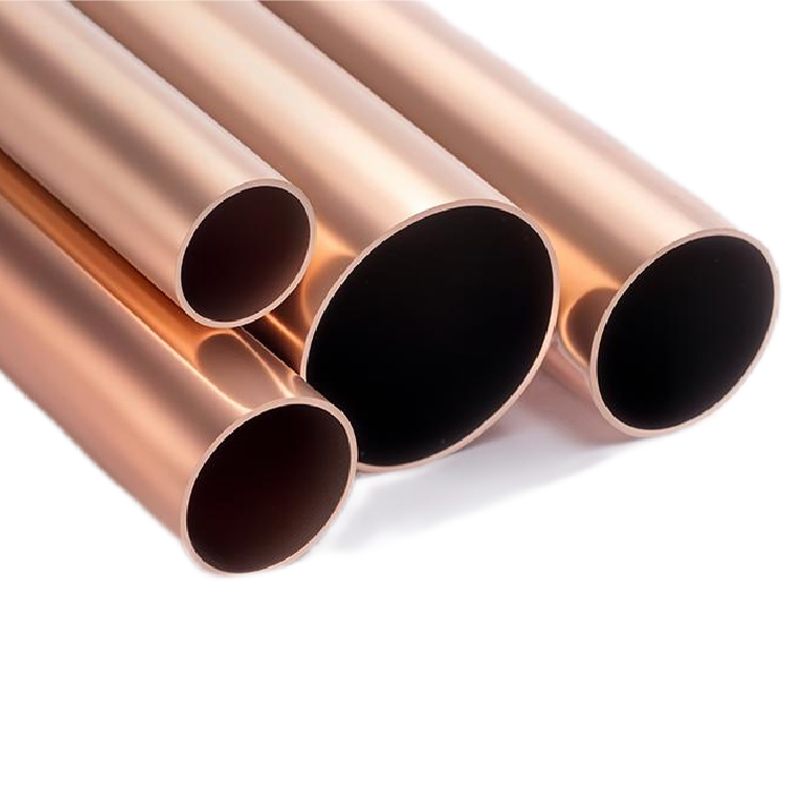
What is a copper tube? Analysis of material composition and basic characteristics Definition of copper tube Copper tube is a tubular object made of co...
See Details -
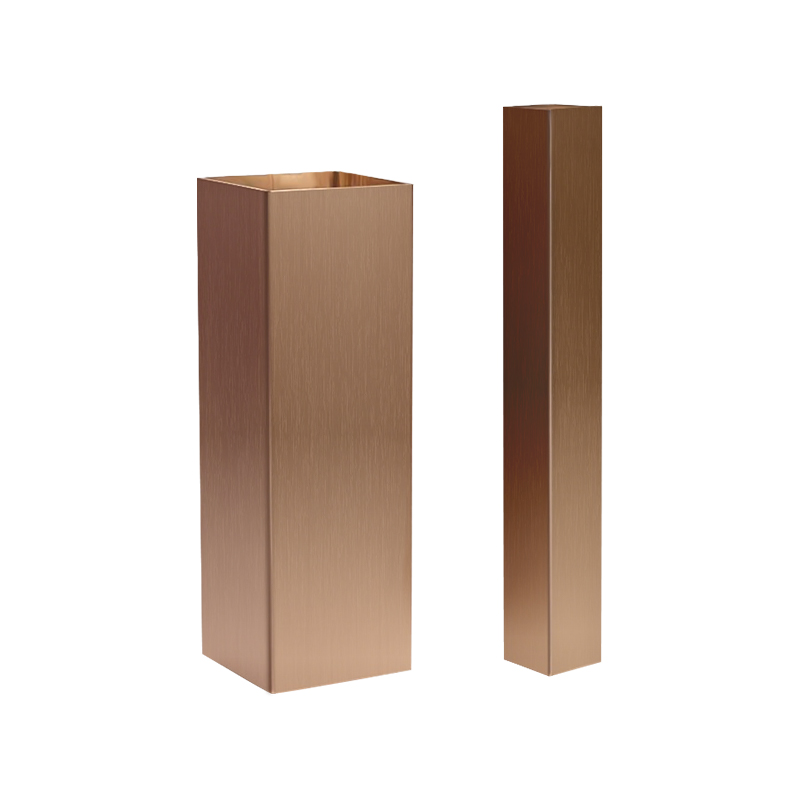
Understanding Copper Square Tubes: Composition, Grades, and Typical Applications Copper square tubes are specialized extrusions that combine the super...
See Details

 English
English Español
Español 中文
中文